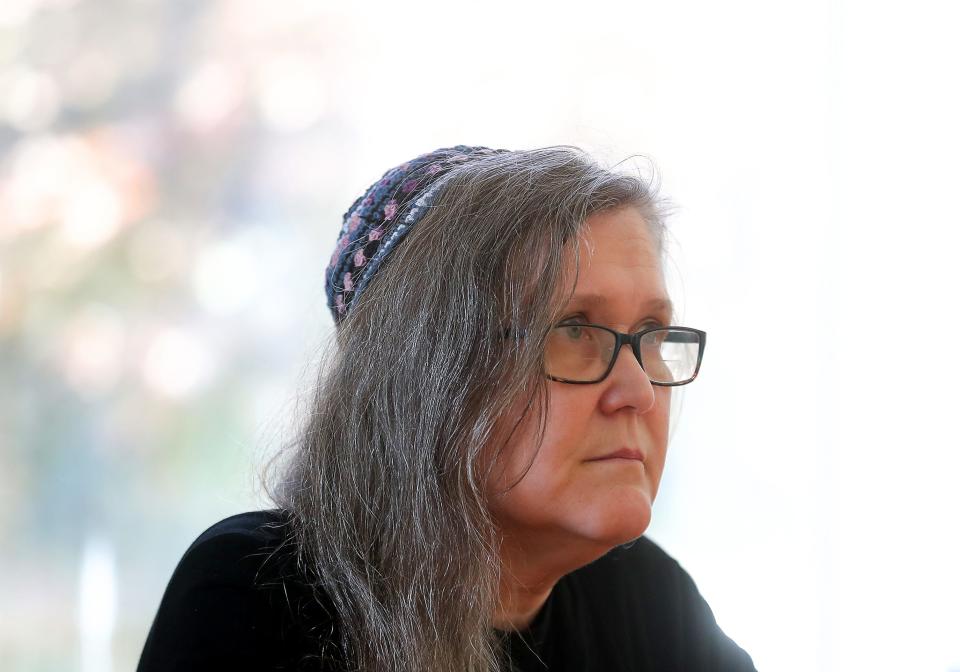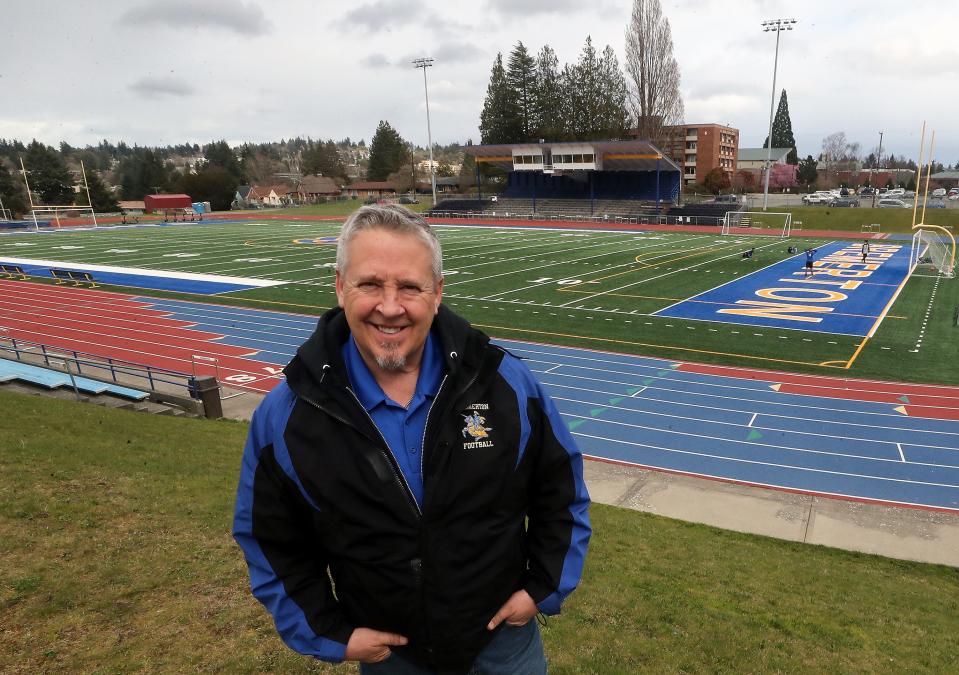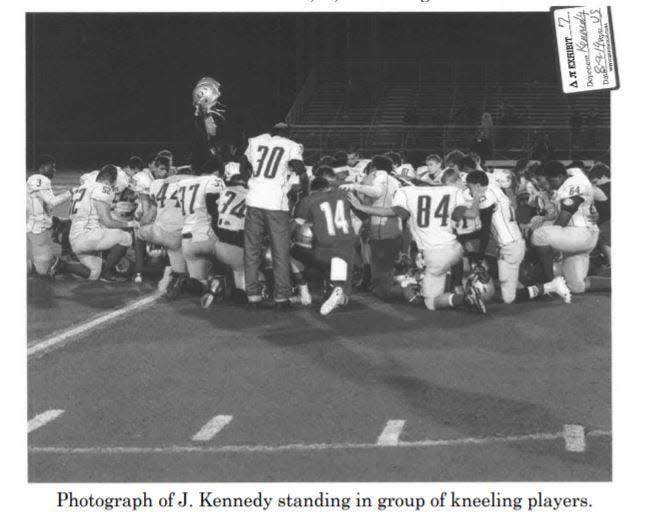For a leader in Bremerton’s Jewish community, Kennedy ruling isn’t a win for religious freedom
A few blocks from the Bremerton High School stadium where football coach Joe Kennedy will perform post-game Christian prayers on a publicly funded field, sits Bremerton’s only synagogue.
Some Christians have hailed the U.S. Supreme Court’s majority decision last month forcing the school to rehire Kennedy and allow him to pray in view of students as a victory for religious freedom.
However, the leader of the small Jewish congregation doesn’t see the decision as meant for the Jewish students and families in the community, with many members of Congregation Beth Hatikvah expressing concern, disappointment, sadness and worry. At the same time, she acknowledges there's a diversity of thought on the issue within her own synagogue and in the wider Jewish community.
“This is for a person who wants to normalize religious practices in school,” Student Rabbi Emily Katcher said in an interview with the Kitsap Sun, speaking for herself. “Most people do not feel it's for them. Most people are very much against prayer in the schools. They know what that's like for Jewish children in a public school.”

Katcher’s assembly of about 40 families is a spiritual homeport for Jewish sailors who transfer to one of the nearby Navy posts, and whose children could attend Bremerton schools and play football for the Knights.
“I don't want that lad, if he decides to play football or anything else for that matter, to feel like being an Evangelical Christian is part of what one must be at that school in order to be OK with all the teachers and coaches, in order to be safe with all the teachers and coaches, in order to be honored as a human being,” Katcher said.
Though Katcher said she was not surprised by the ruling, she was disgusted by the court’s “glossing over” concerns about how a coach praying in front of players could amount to coercion. It tracks with the alienation those of minority faiths often feel in public schools, she said.
“I know very few Jewish people who at some point in their growing up did not go to school and be told that they were going to hell for not accepting Jesus by a little kid,” Katcher said. “Now that is certainly not the perspective of what I hope are most Christians. That's what I hope. I don't know it, but I hope it.”
Katcher was active in efforts by the district’s attorneys leading up to the Supreme Court’s decision, giving interviews to media outlets – including the Sun – and traveling to Washington, D.C. during oral arguments.
On June 27 a majority of justices ruled 6-3 that the district violated Kennedy's constitutional rights by disciplining him for praying after three games in October 2015.
In the leadup to Kennedy’s lawsuit, the district had sought to give him an alternative to praying in public, as, over the years, his prayers had been joined by students. When district officials became aware of what had been happening on the field after games, they said they were bound to follow previous court rulings and tell him to stop.

Kennedy rejected the accommodations offered, continued to perform his post-game prayers in October 2015, and the district did not renew his contract.
Kennedy’s attorneys, and the court’s majority, focused on three public prayers following games that month, but not the uncounted previous mid-field prayers where Bremerton players and others participated.
“Here no one questions that Mr. Kennedy seeks to engage in a sincerely motivated religious exercise involving giving ‘thanks through prayer’ briefly ‘on the playing field’ at the conclusion of each game he coaches,” Justice Neil Gorsuch wrote for the majority. “The contested exercise here does not involve leading prayers with the team; the district disciplined Mr. Kennedy only for his decision to persist in praying quietly without his students after three games in October 2015.”
Kennedy’s interest in coaching football at Bremerton admittedly didn’t come from a deep understanding of the game. As a youth, he grew up in poverty and deprivation, running the streets of Bremerton before finding direction by enlisting in the Marines and becoming a Christian.
In 2008 he joined the team's coaching staff as an assistant after being moved by the Evangelical Christian film “Facing the Giants.” The film is about a private Christian school’s football coach who, through prayer, turns the underperforming team into state champions.
Kennedy said his purpose wasn’t necessarily to win games, but to mentor young men who, like him when he was younger, need a role model and somebody to care for them, and then thank God afterward.
Kennedy told the Kitsap Sun in an interview that he never urged players to join him and held no bad feelings toward those who didn’t.
Further, he said when one player declined to participate in the prayer Kennedy responded by promoting him to team captain. Kennedy said he saw that as a sign of independent thinking, a leadership trait he wanted to encourage.
Katcher called the framing of the conflict as Kennedy only wanting to hold a quick, private prayer “a deceitful narrative,” a phrase coined by a lower court that upheld the district’s actions.
“We saw the photograph,” Katcher said of one group prayer, which showed Kennedy standing over kneeling students, holding helmets above his head. To Katcher he looked like a military leader or preacher.

“It’s as if they say it enough times we’re going to believe them,” Katcher said. “And they’re right.”
Justice Sonia Sotomayor included in her dissent three photos of Kennedy in post-game prayer surrounded by others.
“The record reveals that Kennedy had a longstanding practice of conducting demonstrative prayers on the 50-yard line of the football field,” Sotomayor wrote. “Kennedy consistently invited others to join his prayers and for years led student athletes in prayer at the same time and location. The court ignores this history.”
Though criticized as an attack on the separation of church and state – which some Jewish Americans believe protects their religious freedom – the decision was held as a victory by conservative Christian groups, including the Family Policy Institute of Washington.
“This is a major and just win for free speech and religious freedom,” Larry Sundquist, the Lynnwood group’s board chairman, said in a statement, adding: “The tide is turning.”
Groups representing religious minorities were not as celebratory. The Council for American-Islamic Relations said it believes public school employees have the right to pray and visibly practice their faith, but it was concerned school leaders would not extend the right to employees of all faiths and some students may feel coerced to participate.
"If the Supreme Court truly meant what it said today, then a Muslim high school football school coach observing Ramadan has the right (to) break his or her fast and pray on the field immediately after the end of a game, Muslim students have the right to voluntarily join in the prayer and students of other faiths cannot be directly or indirectly penalized in any way for not participating," Edward Ahmed Mitchell, the group’s national deputy director, said in a statement.
Some Jewish groups praised aspects of the court’s decision, contending that previous court rulings had been too restrictive on religious expression, especially for Jewish leaders who have advocated for “moments of silence” in public schools.
Even for those pleased with parts of the decision, however, some Jewish leaders were concerned with proselytization in schools, according to a story from the Jewish Telegraphic Agency published in the Crescent City Jewish News from New Orleans.
Rabbi Levi Shemtov, executive vice president of American Friends of Lubavitch (Chabad), told journalist Ron Kampeas that, “A parochial prayer can present some real problems while a moment of silence is all but unassailable.”
The Islamic Center of Kitsap County did not respond to an email from the Kitsap Sun seeking comment.
For her part, Katcher sees prayer as an intimate act connecting a human with the divine. She also sees it as inherently coercive if done in a public school setting by an adult.
“He's the coach and they are the players,” Katcher said, saying later: “When a person is a teacher or a coach or a youth pastor, or a Y leader, or a Boy Scout troop leader, a Girl Scout troop leader, you are not just another adult. You are a symbolic exemplar.”
Katcher sees a place for educating students about religion, but it can’t include attempts to win students over to any particular faith, whether directly or indirectly.
“I have been the Hanukkah mom, where I come into the classroom when my kids were little and bring some dreidels and sing the silly dreidel song and tell kids about the oil so that they know what Hanukkah is,” Katcher said. “I'm teaching these kids about our holiday. I'm not going to go there and say, ‘It's because God told us.’ I'm going to say, ‘This is our story.’”
This article originally appeared on Kitsap Sun: Supreme Court praying coach ruling worries Bremerton faith minorities

